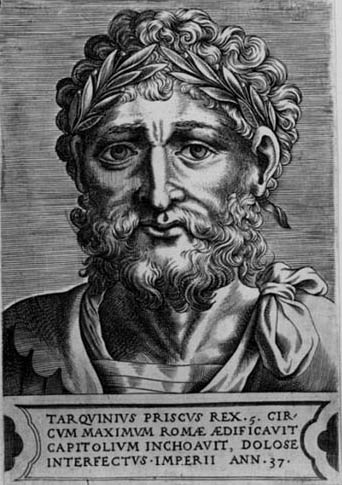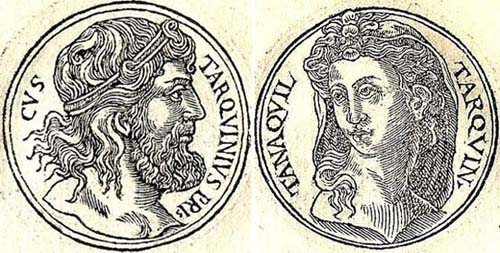
Lucius Tarquinius Priscus, also called Tarquin the Elder or Tarquin I,
was the legendary fifth King of Rome from 616 BC to 579 BC.

Lucius Tarquinius Priscus, also called Tarquin the Elder or Tarquin I,
was the legendary fifth King of Rome from 616 BC to 579 BC.

She had four children, two daughters and two sons. One of the daughters (Tarquinia) became the wife to Servius Tullius, when he became the successor.
The daughter of a powerful Etruscan family in Tarquinii, Etruria, Tanaquil thought her husband would make a good leader, but since he was the son of an immigrant, he would not be able to gain power in Tarquinii, where they lived. Knowing this, Tanaquil encouraged him to move to Rome, which was not at the time dominated by a strong local aristocracy. Her strong prophetic abilities helped her to install Tarquin as king and later Servius Tullius as the next king. While on the road to Rome, an eagle flew off with Tarquin's hat and then returned it to his head. Tanaquil interpreted this as a sign that the gods wanted him to become a king.
Tanaquil's prophecy was eventually realized for Tarquin - he eventually became friends with King Ancus Marcius, who made Tarquin guardian of his children. When the king died before his children were old enough to become successors to the throne, Tarquin used his popularity in the Comitia to be elected the fifth king of Rome. He ruled from 616 to 579 BCE.
Tanaquil also played a role in the rise of Servius Tullius, the sixth king of Rome. Raising him as her own child, Tanaquil believed Servius would be the next successor to the throne. Her dreams would be realized when, one day Servius was sleeping and his head was surrounded with flames. The fires danced around his head without hurting him and when Servius awoke, the fire disappeared. Taking this as an omen, Tanaquil knew Servius would one day be king. When Tarquin was murdered, Tanaquil hid his death from her subjects, instead telling them that Tarquin appointed Servius as a temporary king until he got better. After gaining the people's respect and commanding the kingship, Servius and Tanaquil announced Tarquin's death. Tanaquil had a daughter, (Tarquinia) who married Servius Tullius, and two sons, Lucius Tarquinius Superbus and Aruns Tarquinius, who would marry Tullia, the daughter of Servius Tullius.
According to Festus, she changed her name to Gaia Caecilia (called Gaia Cyrilla in Boccaccio's On Famous Women) when she arrived at Rome, although some Roman historians also commonly spelled her name Caia Caecilia or Caia Cyrilla. Under this name she is the mythical source of various Roman wedding customs. She was remembered as a skillful artisan in the art of working with wool. Queen Gaia was so much admired by the Romans of her day that it was a public decree that any new bride entering their royal palace would announce their name as "Gaia" when asked. This was said to be an omen of future frugality for these women and showed the simple living style of the time period. Pliny says that a statue was dedicated to her as Gaia Caecilia in the temple of Semo Sancus.
According to Livy, Tarquinius Priscus came from the Etruria. Livy claims that his original Etruscan name was Lucumo, but since Lucumo (Etruscan Lucius) is the Etruscan word for "King", there is reason to believe that Priscus' name and title have been confused in the official tradition. After inheriting his father's entire fortune, Lucius attempted to gain a political office.
Disgruntled with his opportunities in Etruria (he had been prohibited from obtaining political office in Tarquinii because of the ethnicity of his father, Demaratus the Corinthian, who came from the Greek city of Corinth), he migrated to Rome with his wife Tanaquil, at her suggestion. Legend has it that on his arrival in Rome in a chariot, an eagle took his cap, flew away and then returned it back upon his head. Tanaquil, who was skilled in prophecy, interpreted this as an omen of his future greatness. In Rome he attained respect through his courtesy. King Ancus Marcius himself noticed Tarquinius and, by his will, appointed Tarquinius guardian of his own sons.
Upon the death of Ancus Marcius, Tarquinius Priscus addressed the Comitia Curiata and convinced them that he should be elected king over Marcius' natural sons, who were still only in their teenage years.
According to Livy, Tarquinius increased the number of the Senate by the addition of 100 men from the minor leading families. Among them was the family of the Octavii, the family of the future first emperor Augustus.
Tarquinius' first war was waged against the Latins. Tarquinius took the Latin town of Apiolae by storm and took great booty from there back to Rome. According to the Fasti Triumphales, the war occurred prior to 588 BC.
His military ability was tested by an attack from the Sabines. The Sabines received auxiliaries from five Etruscan cities. Tarquinius doubled the numbers of equites to help the war effort. The Sabines were defeated after dangerous street fighting in Rome. In the peace negotiations that followed, Tarquinius received the town of Collatia and appointed his nephew Aruns Tarquinius, surnamed Egerius, as commander of the garrison which he stationed in that city. Tarquinius returned to Rome and celebrated a triumph for his victories over the Sabines which, according to the Fasti Triumphales, occurred on 13th September 585 BC.
Subsequently the Latin cities of Corniculum, old Ficulea, Cameria, Crustumerium, Ameriola, Medullia and Nomentum were subdued and became Roman.
Since Tarquinius made it a point to keep the captured Etruscan auxiliaries as prisoners for meddling in the war, the five Etruscan cities who had taken part declared war on Rome. These five cities managed to convince seven other Etruscan cities to join forces with them. The Etruscans soon captured the Roman colony at Fidenae, which thereupon became the focal point of the war. After several bloody battles, Tarquinius was once again victorious and subjugated the Etruscan cities who had taken part in the war. After each of these wars, which were always extremely successful, Tarquinius brought rich plunder to Rome.
Tarquinius established the Circus Maximus. Raised seating was erected privately by the senators and equites, and other areas were marked out for private citizens. According to Livy horses and boxers from Etruria were sent for as the first to participate in the thenceforth annual games.
After a great flood, the damp lowlands of Rome were drained by the construction of the Cloaca Maxima (great sewer). He also constructed a stone wall around Rome. As his last great act he began the construction of a temple in honor of Jupiter Optimus Maximus on the Capitoline Hill, partially funded by plunder seized from the Sabines.
Many of the Roman symbols both of war and of civil office date from his reign, and he was the first to celebrate a Roman triumph, after the Etruscan fashion, wearing a robe of purple and gold, and borne on a chariot drawn by four horses.
Tarquinius reigned for 38 years. Meanwhile the now adult sons of his predecessor Ancus Marcius thought that the throne should fall to them. Thus they arranged for Tarquinius Priscus to be assassinated with an axe blow to the head. Thanks to the intelligent foresight of the queen Tanaquil however, the sons of Ancus were not chosen, but rather Tarquinius' son-in-law Servius Tullius, husband of his daughter Tarquinia, was elected as his successor. Tarquinius' other daughter, Tarquinia, married Marcus Junius Brutus (father of Lucius Junius Brutus). Tarquinius' sons were Lucius Tarquinius Superbus and Aruns Tarquinius, both of whom married the daughters of Servius Tullius, named Tulliae.
ALPHABETICAL INDEX OF ALL FILES